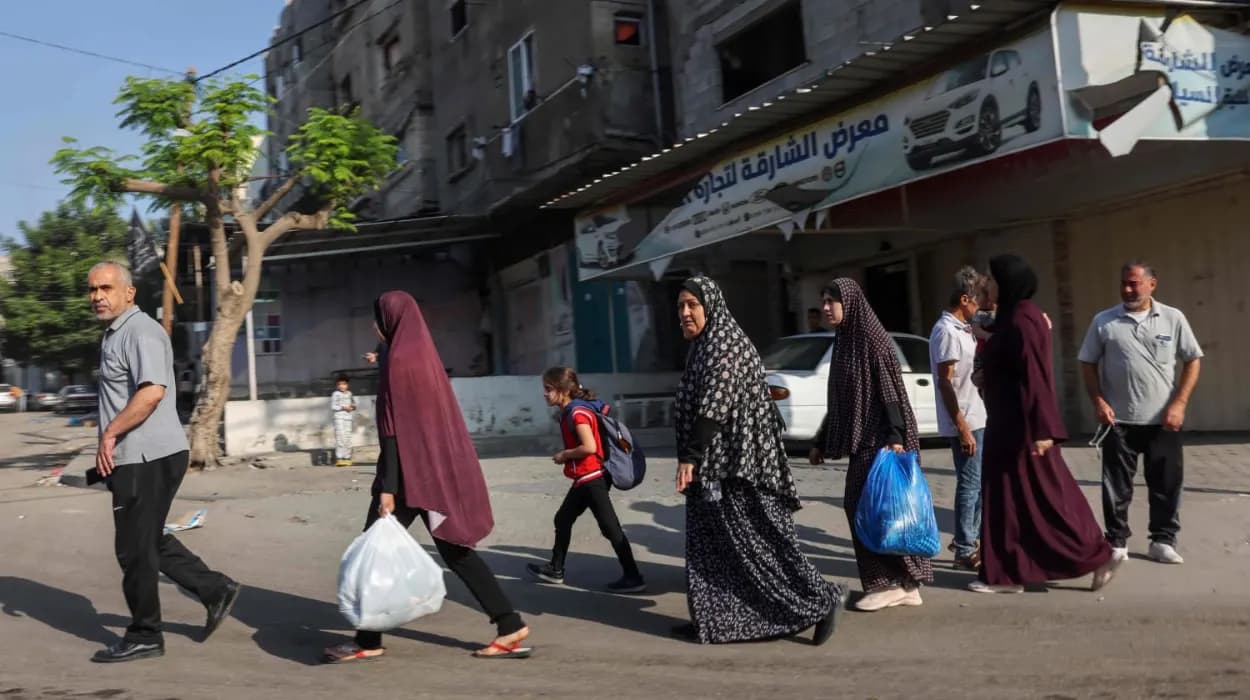More Palestinian families have evacuated Gaza City following
a night of intense Israeli shelling on the eastern outskirts, including Sabra,
Shejaia, Tuffah, and Jabalia. The Israeli military accuses militants of using
tunnels and weapons caches in these areas. Meanwhile, Israelis launched
nationwide protests calling for hostage releases and an end to the Gaza
conflict, highlighting deep divisions and uncertainty about the war's future.
Intense Bombardment Forces Palestinian Evacuations
More Palestinian families left Gaza City on Tuesday after a
severe night of Israeli air and tank shelling concentrated on the eastern
outskirts and northern towns such as Jabalia. Local residents reported
continuous bombardments that damaged homes and roads in the suburbs of Sabra,
Shejaia, Tuffah, and others around Gaza City.
Ismail, a 40-year-old Gaza City resident, described the shelling as resembling "earthquakes" intended to intimidate residents into abandoning their homes. He said,
"These are like earthquakes; they aim to intimidate people into abandoning their residences".
The Israeli Occupation Forces (IOF) stated that their
operations aimed to uncover weaponry and destroy tunnels used by militant
groups, as Gaza City is described by Israel as the last stronghold of Hamas.
Death Toll and Damage from Israeli Strikes
Israeli strikes hit the Nasser Hospital in southern GazaStrip on Monday, killing at least 20 individuals, including journalists from
Reuters, Associated Press, Al Jazeera, and other media outlets. The attacks
have drawn widespread international condemnation. Local health authorities
reported at least 34 deaths due to overnight and early morning strikes, with 18
fatalities around Gaza City alone.
Raphael Hussam al-Mri, a Reuters contractor and cameraman,
was among those killed near a live broadcast site at Nasser Hospital. IsraeliPrime Minister Benjamin Netanyahu expressed "deep regret" over what
he termed a "tragic mishap," though the IDF has not provided detailed
information about the incident.
Displacement and Humanitarian Crisis Deepen
Approximately half of Gaza’s two million residents live in
Gaza City. Tens of thousands have moved westward into the city's urban centre
and coastal areas, while others have relocated southward towards central Gaza
and the Al-Muwasi coastal region near Khan Younis.
The ongoing Israeli military offensive, initiated in
response to the October 7, 2023, Hamas attack on southern Israel, has caused
massive displacement and a humanitarian crisis in Gaza. Since the war began, at
least 62,000 Palestinians, primarily civilians, have been killed, according to
Gaza’s health ministry, and nearly the entire population has been internally
displaced.
Nationwide Israeli Protests Demand Hostage Release and War’s End
Within Israel, a day of widespread protests unfolded as
demonstrators blocked roads in Tel Aviv and other cities. Protesters held
images of hostages still held in Gaza while calling for an end to the war. A
large rally planned outside Israel's defence headquarters was expected to draw
thousands.
Einav Zangauker, mother of Israeli hostage Matan Zangauker, and other families spearheaded the "Day of Disruption," voicing frustration at the government's handling of the conflict. She remarked,
"For 690 days, the government has been waging a war without a clear objective. How will the hostages, both the living and the fallen, be returned? Who will govern Gaza the day after? How do we rebuild our country?"
Conflict Origins and Current Status
The war originated on October 7, 2023, when Hamas militants
launched a large-scale attack on southern Israel, killing approximately 1,200
people, mostly civilians, and taking 251 hostages. Israel responded with a
military offensive targeting Hamas positions in Gaza, leading to significant
casualties and a devastated enclave.
Despite international calls for ceasefire and humanitarian
relief, Israel is preparing for further military operations aimed at dislodging
Hamas, particularly in Gaza City, the militant group’s stronghold.
This developing situation highlights the escalating
humanitarian toll on Palestinians in Gaza, the mounting civilian casualties,
and the rising pressure within Israel from protest movements demanding clarity
on hostage situations and resolution pathways. The international community
continues to watch closely as the conflict unfolds with profound consequences
for the region’s future.
